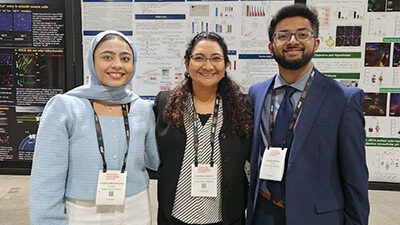Bile acid malabsorption-associated diarrhea (BAD) affects over 200 million individuals globally, particularly those who suffer from irritable bowel syndrome (IBS) and inflammatory bowel diseases (IBD). While probiotic supplements are commonly used to alleviate these symptoms, their precise mechanism of action in the human colon remains elusive.
In a recent study led by Dr. Jayashree Sarathy, Ph.D., Professor of Biological Sciences, and her senior undergraduate student researchers Zohaib Farooq and Ayesha Moosani, the team investigated the effects of varying doses of bile acids on human colonic cells and microbial strains from common probiotic supplements. The Sarathy lab’s findings revealed that structural disparities in bile acids led to varying impacts on colonic cells and bacterial strains. Specifically, di-hydroxy bile acids, prevalent in IBD patients’ colons, exhibited more detrimental effects on epithelial cell and bacterial strain growth.
This research, conducted as part of the Natural Science Summer Research Program (NSSRP) at Benedictine University and funded by the American Physiological Society and NSSRP, was presented by Zohaib Farooq and Ayesha Moosani at the American Physiology Summit in April 2024 in Long Beach, CA. Zohaib Farooq’s research proposal earned him the Summer Undergraduate Research Fellowship award, which included a travel grant to attend the summit. This recognition underscored the study’s importance within the scientific community, providing valuable insights into potential therapeutic avenues for and treatment for diarrheal diseases.
The students’ presentation was very well received by the Cell and Molecular Physiology section poster presentation and they were able to interact and network with other world-renowned researchers in the bile acid and gastrointestinal physiology field. This comprehensive investigation not only sheds light on the intricate interplay between bile acids, microbiota, and epithelial cells but also underscores the promising prospects for developing targeted therapies in gastrointestinal physiology.
Furthermore, Dr. Sarathy shared her experiences at the summit, highlighting the engagement of alumni as peer mentors and initiatives fostering belonging and success among graduate students in the Master of Science in Integrative Physiology (MSIP) program. Results from student surveys, interviews, performance metrics in tests, and peer mentor feedback were presented to demonstrate the MSIP program’s effectiveness and peer mentor success. Peer mentoring aids active learning, boosts confidence, and success, particularly for first-generation and underrepresented students. She was honored to receive a Teaching of Physiology Travel Fellowship Award to present her findings. Overall, it was an enriching learning experience for all in the Sarathy lab this April.
Learn more about the programs in the College of Science & Health.








